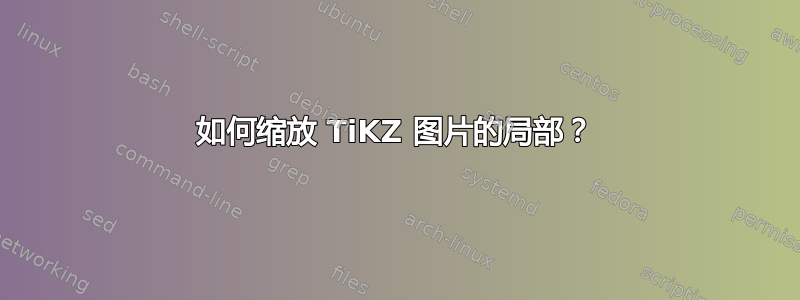
我想在 tikz 图片中绘制一个小矩形,然后将其缩小到某个位置。我浏览了 PGF 手册,但找不到将逻辑组合在一起的方法。到目前为止,我刚刚绘制了自动机图,但我不得不用“paint”破解蓝色矩形 :(。有人可以帮我吗?谢谢。

最小工作示例
\documentclass[10pt,letterpaper]{article}
\usepackage[left=1in,right=1in,top=1in,bottom=1in]{geometry}
\usepackage{amsmath}
\usepackage{amsfonts}
\usepackage{amssymb}
\usepackage{amsthm}
\usepackage[version=0.96]{pgf}
\usepackage{tikz}
\usetikzlibrary{arrows,shapes,automata,backgrounds,petri,positioning}
\usetikzlibrary{decorations.pathmorphing}
\usetikzlibrary{decorations.shapes}
\usetikzlibrary{decorations.text}
\usetikzlibrary{decorations.fractals}
\usetikzlibrary{decorations.footprints}
\usetikzlibrary{shadows}
\begin{document}
\begin{center}
\begin{tikzpicture}[shorten >=1pt, node distance=3cm, auto, on grid, initial text=,font=\small,>=stealth',
every state/.style={minimum size=7mm,draw=black!50,very thick,fill=red!50}]
\node[state,initial] (S) {S};
\node[state] (A) [right=of S] {A};
\node[state] (B) [below=of S] {B};
\node[state,accepting] (C) [right=of B] {C};
\path[->]
(S) edge[bend right] node{a} (A)
(S) edge[bend right] node[xshift=-4mm]{$\lambda$} (B)
(A) edge[bend right] node[yshift=5mm]{a,b} (S)
(A) edge[] node{$\lambda$} (C)
(A) edge[] node[yshift=7mm]{b} (B)
(B) edge[bend left] node{b, $\lambda$} (C)
(B) edge[bend right] node[xshift=4mm]{a} (S)
(C) edge[bend left] node{a,b} (B)
;
\end{tikzpicture}
\end{center}
\end{document}
答案1
这spy库就是为此而创建的。这里有一个例子。请参阅第 49 节中的 PGF/TikZ 手册间谍图书馆:放大图片的部分内容,第 462 页,了解更多详情。
\documentclass[10pt,letterpaper]{article}
\usepackage[left=1in,right=1in,top=1in,bottom=1in]{geometry}
\usepackage{amsmath}
\usepackage{amsfonts}
\usepackage{amssymb}
\usepackage{amsthm}
\usepackage[version=0.96]{pgf}
\usepackage{tikz}
\usetikzlibrary{arrows,shapes,automata,backgrounds,petri,positioning}
\usetikzlibrary{decorations.pathmorphing}
\usetikzlibrary{decorations.shapes}
\usetikzlibrary{decorations.text}
\usetikzlibrary{decorations.fractals}
\usetikzlibrary{decorations.footprints}
\usetikzlibrary{shadows}
\usetikzlibrary{calc}
\usetikzlibrary{spy}
\begin{document}
\begin{center}
\begin{tikzpicture}[shorten >=1pt, node distance=3cm, auto, on grid, initial text=,font=\small,>=stealth',
every state/.style={minimum size=7mm,draw=black!50,very thick,fill=red!50},spy using outlines]
\node[state,initial] (S) {S};
\node[state] (A) [right=of S] {A};
\node[state] (B) [below=of S] {B};
\node[state,accepting] (C) [right=of B] {C};
\path[->]
(S) edge[bend right] node{a} (A)
(S) edge[bend right] node[xshift=-4mm]{$\lambda$} (B)
(A) edge[bend right] node[yshift=5mm]{a,b} (S)
(A) edge[] node{$\lambda$} (C)
(A) edge[] node[yshift=7mm]{b} (B)
(B) edge[bend left] node{b, $\lambda$} (C)
(B) edge[bend right] node[xshift=4mm]{a} (S)
(C) edge[bend left] node{a,b} (B)
;
\spy [blue,draw,height=5cm,width=10cm,magnification=2,connect spies] on ($(B)!.5!(C)$) in node at ($(B)!.5!(C) + (0,-5) $);
\end{tikzpicture}
\end{center}
\end{document}



